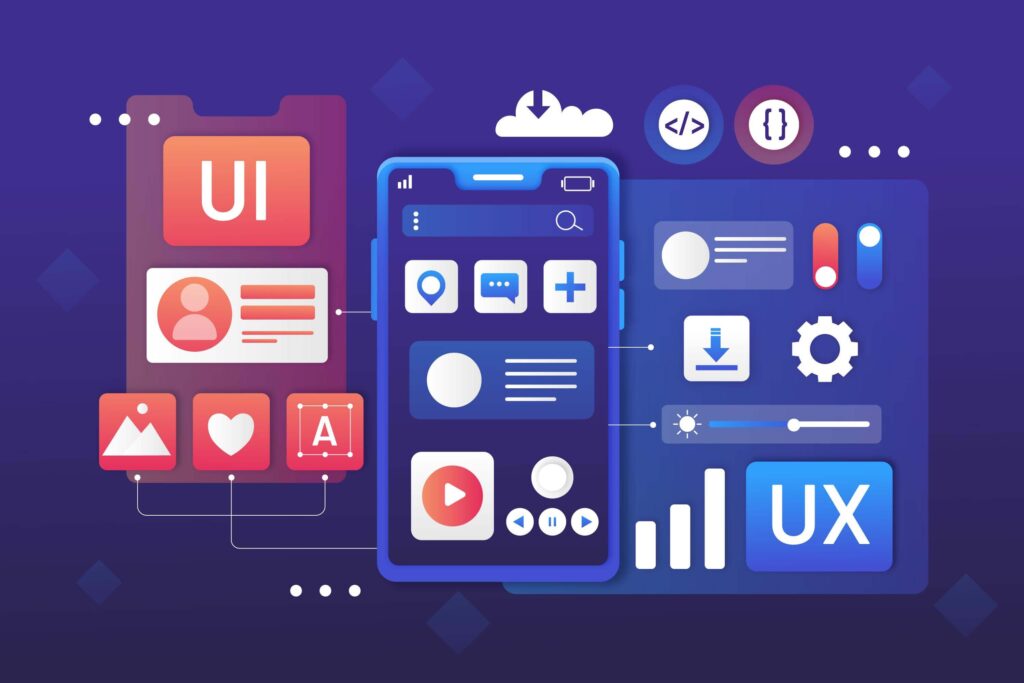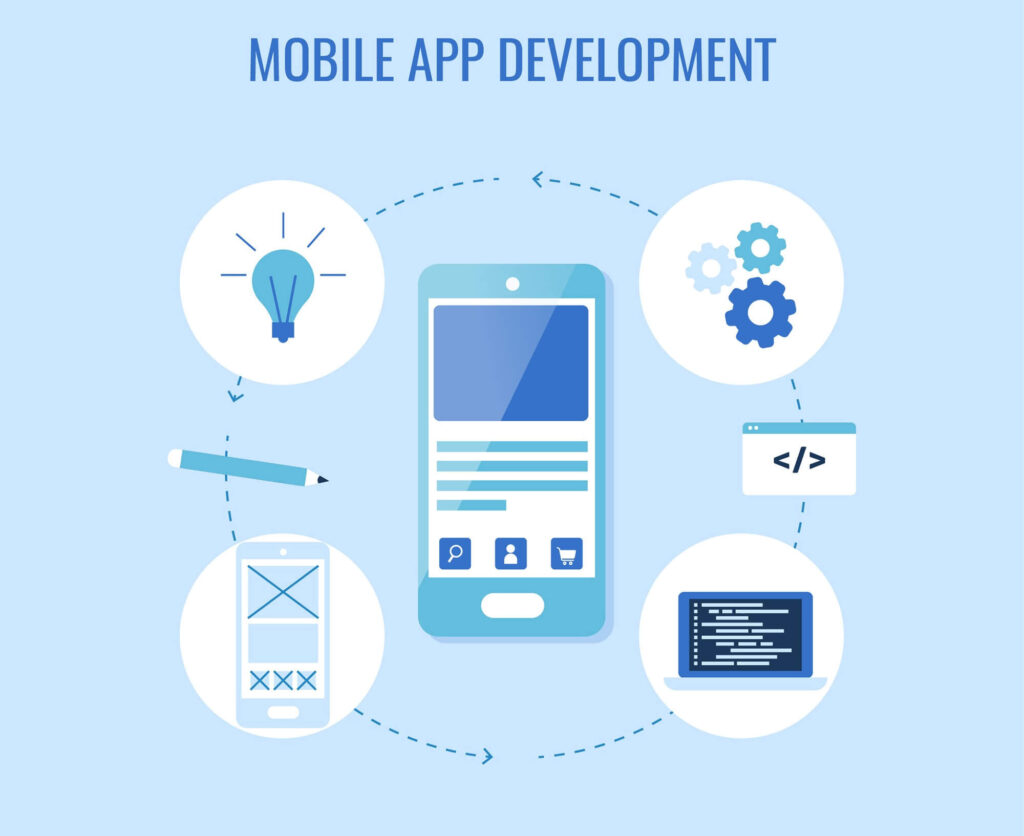Mobile Application Definition
Software programs created specifically to run on mobile devices such as smartphones and tablets are known as mobile applications or simply mobile apps. These programs have several uses, ranging from entertainment to productivity tools and everything in between.
Mobile applications, which provide answers to a wide range of needs and preferences, have become an essential part of our daily lives in a world where people increasingly rely on the convenience and mobility of digital technology. The essence of mobile applications in our contemporary interconnected society is captured in this brief introduction. This interconnectedness is further bolstered by the strategic deployment of digital marketing efforts, which ensure these applications reach their intended audiences effectively.
What is Mobile Application Development?
The difficult process of developing software packages specifically for usage on mobile devices, such as smartphones and tablets, is known as mobile application development. This is a complex field that involves many layers, starting with concept generation and customer needs identification.
The process then moves on to the development phase, where qualified developers build the code and meticulously review the utility to ensure that it satisfies the desired criteria for capabilities and user experience. When mobile software is optimized, it is ready to be released and made accessible to users through stores like app stores.
Key Mobile Application Development Technologies
Technologies such as Artificial Intelligence (AI) and Augmented Reality (AR) have gained prominence in recent times to improve the user experience, opening the door to more user-friendly and immersive applications.
Furthermore, the infrastructure and storage required for mobile apps are provided by cloud computing and mobile backend-as-a-service (MBaaS), guaranteeing scalability and flawless performance. These technologies, which are always changing, are the cornerstones that allow creative and dynamic mobile applications to be developed, influencing how we engage with the digital world.

Services for Development of Mobile Applications
In the quick-paced global cell era, offerings for mobile application development are essential to shaping the digital environment. These services include concept creation, application layout, testing, deployment, and coding, among many more products and services. Applying their expertise, knowledgeable developers create apps that fulfil a range of requirements, like improving productivity, streamlining communication, or creating amusement.
Furthermore, upgrades and protection are offered by mobile application development services, guaranteeing that programmes continue to be useful and relevant in a dynamic setting. As a result, mobile software development services are essential to bringing comfort and innovation into our everyday lives as well as to the expansion of companies and the virtual ecosystem in general.
Types of Mobile Applications
Mobile application development serves a wide range of purposes and functions, making them just as varied as the consumers who depend on them. Among the most popular categories are productivity-boosting utility apps such as document scanning and task management. Apps for communication, such as social networking and messaging services, make connections and interaction easy.
From mobile games to streaming services, entertainment applications provide a universe of multimedia experiences that may keep you occupied for hours on end. E-commerce has also grown significantly, with finance and shopping apps making money management and transactions easier. While educational apps put knowledge and abilities at the user’s fingertips, health and fitness apps assist users in keeping an eye on their well-being.
Mobile Applications and Device Platforms
Mobile packages are intricately connected to the systems on which they function, with every platform supplying a unique ecosystem for developers and users. The two primary contenders, iOS and Android, have distinct characteristics. IOS, developed by Apple, is known for its sleek and user-pleasant interface, which presents a steady environment for app distribution through the App Store. On the other hand, Android, sponsored by Google, embraces an open-source approach, allowing a broader range of customization and versatility for developers.
Because of the differences between the platforms, programs were created especially for each; some of them are available and others are different. Users can choose from a variety of apps for this reason, although their compatibility varies depending on the device they are using. The complex relationship between mobile applications and device platforms is important for the mobile technology market because it gives consumers choice and developers the opportunity to serve different customers.

Conclusion
Mobile application development is the lifeblood of our interconnected digital age. It transforms concepts into innovative software applications that cater to a vast spectrum of needs and preferences, enhancing connectivity, efficiency, and ease of use. The dynamic process involves conceiving, coding, and refining applications to ensure they meet users’ expectations.
Mobile apps, tailored for smartphones and tablets, have become indispensable in our daily lives, making us increasingly reliant on the convenience and mobility of digital technology. In this landscape, the emergence of technologies like AI and AR has elevated user experiences, ensuring mobile applications remain immersive and user-friendly.
Frequently Asked Questions
Q1: Why is application development important?
Application development is very important as it empowers businesses and people to meet their changing needs effectively. It promotes productivity, communication, and entertainment, changing daily life. These tools streamline operations, promote connectivity, and provide innovative solutions. With the continuous growth of technology, application development is still an important factor in adapting to the changes demanded and managing the power of digital innovation.
Q2: What are the features of Mobile Application Development?
The development of mobile applications includes a number of crucial components. Concepts are the first, and then there’s coding, testing, and tweaking to make it user-friendly. Numerous types of mobile apps that address productivity, communication, entertainment, and other topics are produced as a result of this process. The user experience is improved by key technologies like AI and AR, while scalability is ensured by cloud computing and MBaaS. In the current digital era, when innovation and connectedness are continuously changing our lives, it is essential.
Read More Blog:
Best School Mobile App Development Company in India (2024)
Migrate From WordPress to Shopify in 2024
Image by freepik on Image by freepik
More Blogs You May Like
- How do Digital Marketing Companies Transform Businesses in Digital Age?
- How Organic SEO Services Keep Your Business Ahead in Search Results
- Blockchain Development Company in India
- Why Your Business Needs a Custom CRM or ERP System
- Trading Apps and Real-Time Data: Driving Accuracy and Profitability
- Top Generative AI Company- Netleon
- Real Estate Website Development Company in India
- The Dynamic Duo: Web Development and Android App Development
- A Guide to Developing Grocery Delivery Apps
- How to Create a Grocery Delivery App Like Instacart – Features, Cost, & More!


